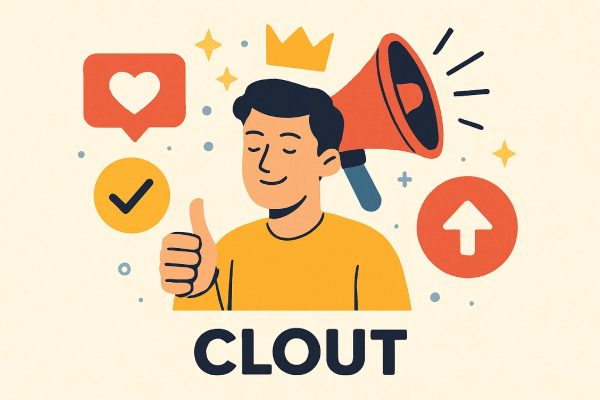Did you ever find your child using the word “clout” on the Internet? Or maybe you have seen it in a YouTube caption or comment, because the word ‘clout’ shows up everywhere today. But what does it really mean? Let’s know the meanings of this word, parents. Understanding the meaning of clout can help parents guide their children in this fast-paced digital world.
Clout is not just a slang word. It indicates how young people see themselves and others online. It connects to influence, attention, and reputation. In a world where likes and followers matter, clout has real power.
This blog breaks down what it means, how it evolved, and why it matters to you to know its meaning. You will learn how it affects children’s confidence, behavior, and choices. Let’s get started.
What does clout mean?
The history of the word clout is interesting. It originated in Old English as clūt, which means a patch or piece of cloth. Over time, the meaning grew. It was also used in Middle English to describe a piece of metal or a target used in archery. It was later applied as a physical blow to someone. An example- give someone a clout on the head.
By the middle of the 20th century, it began to mean influence, power, or prestige. It is used for people in politics, business, or in social life. A person with so-called clout is respected or listened to by others.
In the current social media culture, clout refers to digital influence —the ability to attract attention and engagement online.
Monitor and manage your child’s digital habits effortlessly with our app!
Exploring the meaning of “clout” in different contexts



Political and professional clout
Political clout refers to the influence on government decisions or opinions. Politicians, activists, and lobbyists build it through their contacts. Their power can shape legislatures, movements, and opinions.
Authority and credibility in professional life are referred to as clout. A highly clout leader can close deals, motivate teams, and attract investors. This power is based on experience, reputation, and credibility.
Influence in such situations is a responsibility. Influence can be used effectively or abused by people with it. Their decisions can influence industries and communities.
Social media and digital clout
It is a different form of currency in the digital era. Social media clout is a measure of an individual’s visibility and influence on the internet. It is expressed in likes, shares, followers, and engagement.
Famous social media platforms, such as TikTok, Instagram, and YouTube, are built on it. Highly engaged people can influence trends and opinions. This is the reason people refer to them as influencers.
Creativity and connection can be empowered through digital clout. Yet it can also create stress. Individuals can seek fame rather than genuineness. Others go that far and become risky in order to attract followers.
But not all clout is negative. Most creators have a positive influence in the digital world, spreading awareness, championing causes, and supporting communities. Online clout is a positive force when exercised responsibly.
Colloquial and slang uses of “Clout”
Clout in slang refers to popularity or fame on the Internet. When someone comments that someone has clout, they mean that person has influence or status.
The term “clout chasing” refers to an individual who seeks attention or fame, often by following a trend or associating with an influential person.
The meaning of ‘clout’ among adolescents is often related to confirmation. It may seem like social validation. It is an indicator of belonging, recognition, or importance.
Still in British English, clout may mean influence or authority without fame. In American slang, however, it tends to be associated with social media status.
Hip-hop culture brought slang use to the mainstream. Songs such as “Clout” by Offset and Cardi B (2019) show that society pursues popularity and fame online.
Positive vs. negative connotations of clout
It can empower or harm. It depends on how people use it.
On the positive side, it can inspire individuals and enable them to change. It is utilized by influencers to advocate for good causes, raise awareness on mental health, or raise money for charities. Clout partnerships enable businesses to authentically influence audiences.
But the impact can also be harmful. Social media is a platform of perfection and pressure, where people value attention more than honesty. When teens don’t get enough likes or followers, they may feel anxious or inadequate.
Being aware of both sides helps parents have a realistic conversation with their children regarding it.
The impact of clout on youth and society



To the young generation of today, popularity is self-esteem. Most teens see their achievements in terms of the number of followers and likes. This analogy can influence their mood, confidence, and even their identity.
This quest for influence can drive young users to engage in dangerous activities. The need to be recognized is one of the triggers of viral challenges, exaggerated posts, or even fake personas.
Simultaneously, creativity can be digitally enabled. Online, teens can express their art, humor, and passion. Social media provides them with a voice and community.
Parents must be aware of both sides of the freedom and the pressure. It is a lens through which lots of teens perceive the world.
Related terms and cultural phenomena
Many related words have been derived using the word clout:
- Clout chaser: a person who wants to be famous or well-liked through his/her connections with others.
- Clout chasing: a behavior of committing an action just because you want to be noticed.
- Clout drop: refers to the act of releasing or launching new merchandise, often in a limited-edition format, to generate hype and reinforce a brand’s influence or clout.
The term “clout culture” describes the obsession with social media validation. It shows how individuals gauge value based on appearance rather than content.
Knowing these words will help parents understand what children mean when they discuss fame, likes, or influence.
Strategies for helping your children navigate the concept of Clout
It is not easy to raise children in the digital era. This culture brings new challenges. However, parents could also take practical steps to show their children the right way.
Talk openly about social media influence
Open up and talk honestly about its meaning. Ask your child what he or she defines it as. Listen without judgment. Discuss how online popularity is short-lived and deceitful.
Show them that character and integrity are the true power. Help them understand that popularity is not equal to value.
Encourage balance and boundaries
Help your children create healthy digital habits. Set limits on screen time. Encourage offline hobbies and real-world friendships. Remind them that life exists beyond likes and followers.



You can also use parental control tools, such as FlashGet Kids, to monitor social media activity. This app helps you track online behavior, set usage schedules, and block unsafe content. It’s a great way to support responsible digital habits.
Model mindful online behavior
Children learn by watching. Demonstrate to them how to use social media responsibly. Do not be overly descriptive or seek approval on the internet. Be discriminating between what you post and what you follow.
Your behavior will instruct your child to be aware of the this culture and how to manage it.
Build digital literacy
Teach your children how algorithms work. Explain how platforms reward content that keeps users engaged. Help them see that not everything popular online is real or meaningful.
Encourage them to verify information before sharing. Promote critical thinking by discussing how trends spread and why.
Reinforce self-worth beyond Clout
Encourage your child to have confidence in the things he/she can accomplish offline. Compliment their work at school, sports, or hobbies. Congratulate little victories that have nothing to do with screens.
As a result, children can find satisfaction in offline activities and become less reliant on online acceptance.
Stay updated as a parent
Social media changes fast. Every year, new platforms and trends emerge. Keep track of the apps your child is using and learn the slang terms.
Read articles, watch expert talks, and engage in parent communities online. The more familiar you are with the digital environment, the easier it is to guide your child through it.
Conclusion
The meaning of ‘clout’ is easy to understand, yet it is a profound social phenomenon. It symbolizes the way individuals acquire fame, power, and recognition in the online era. For parents, understanding clout means understanding the pressures your children face online.
Clout may bring creativity and relationships. It may also result in stress and self-doubt. The key is balance. Teach your children that it is not the ultimate achievement, but a side-effect of real work and generosity. Show them that integrity is power, and not popularity.
These lessons do not go away, and social media continues to transform. As families discuss clout with sincerity and sensitivity, they get resilient. They bring up a generation that appreciates genuineness rather than fame.

